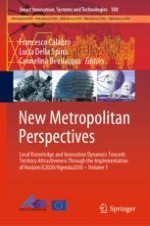2019 | OriginalPaper | Buchkapitel
The Neutrality Between “Us” and “Others”, a Framework for Sustainable Social/Cultural Urban Development
A Tool of Analysis and a Goal for Urban Intervention
verfasst von : Mohammed Ezzat
Erschienen in: New Metropolitan Perspectives
Aktivieren Sie unsere intelligente Suche, um passende Fachinhalte oder Patente zu finden.
Wählen Sie Textabschnitte aus um mit Künstlicher Intelligenz passenden Patente zu finden. powered by
Markieren Sie Textabschnitte, um KI-gestützt weitere passende Inhalte zu finden. powered by
